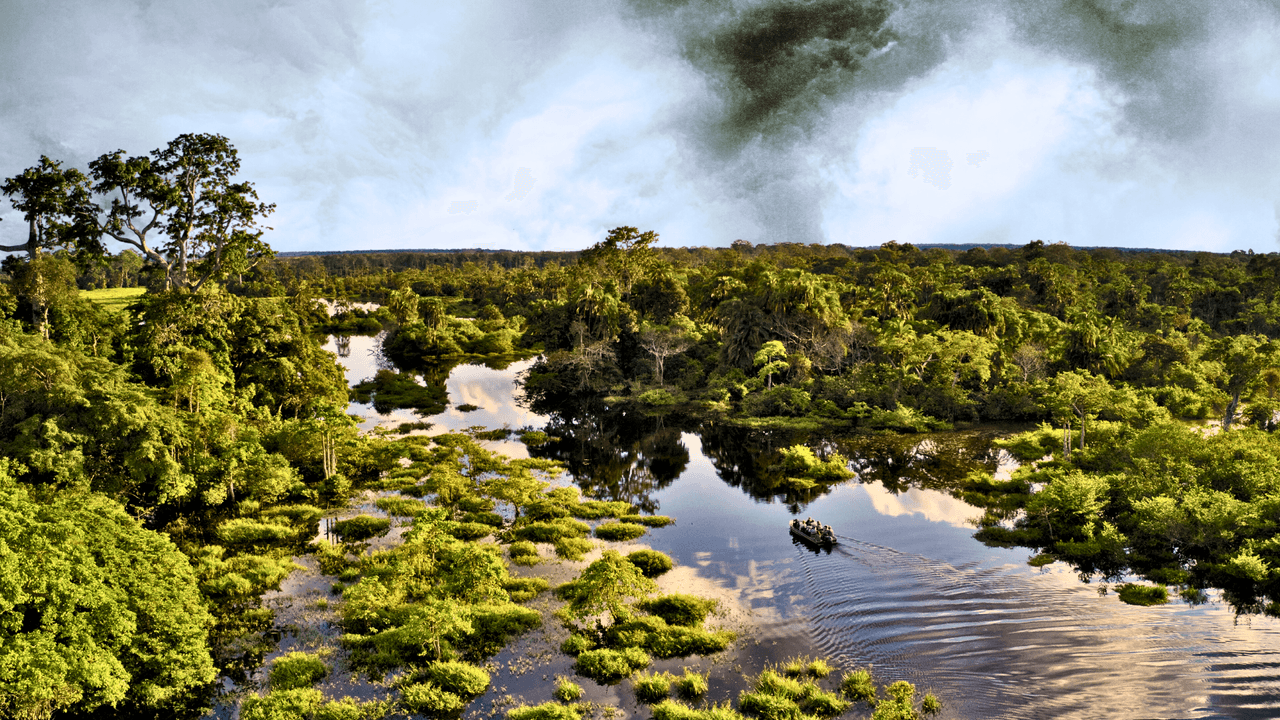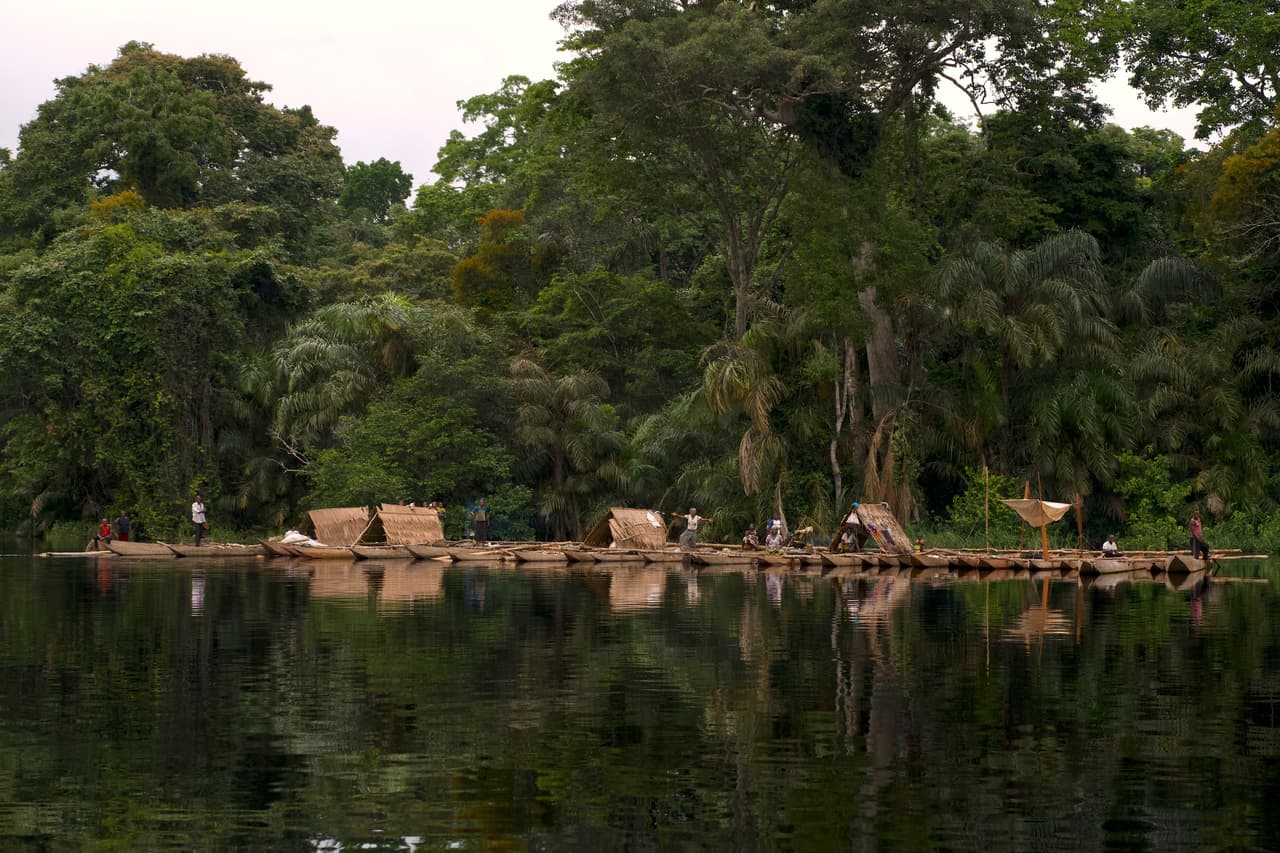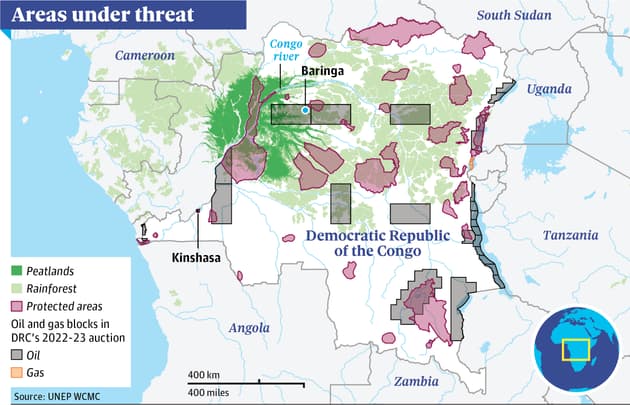
Why the Congo Basin is vital in the fight against climate breakdown
Fossil fuel extraction is destroying the planet. As the climate crisis accelerates, even the world’s major oil and gas companies now openly accept the need to transition to sustainable sources of energy for the sake of our future.
Two years ago, the International Energy Agency declared that the key aim set out in the Paris Agreement – to limit global heating to 1.5C – could only be achieved by halting all investment in new oil and gas infrastructure worldwide.
Yet money continues to be poured into fossil fuels – and these investments have been rising in Africa, where an area larger than France and Italy combined has been licensed for oil and gas exploration since 2017. Nor does this look set to slow down: oil and gas companies are currently searching for new hydrocarbon reserves in 45 African countries.
One of these is the Democratic Republic of Congo (DRC), which last May announced an auction for the rights to explore for oil and gas within its borders, despite protests from national and international non-governmental organisations. The government says the country may have up to 16bn barrels of oil, and that some of those reserves lie under the rainforest. Experts say the project is a “carbon bomb” that threatens one of the last and most critical frontiers in the battle against climate breakdown: the Congo Basin rainforest.
What’s the Congo Basin?
The Congo Basin is the largest expanse of intact rainforest outside of the Amazon. Years of rampant deforestation in the Amazon, however, means more emissions are released due to fires and agriculture than are captured by the trees. This means the Congo Basin is now the only tropical rainforest in the world with enough trees still standing to absorb substantially more CO2 than it emits.
It stretches across six countries but the majority of it is in the DRC, where it is home to 15.2 million people. Last July, the DRC government announced that huge parts of this land would be parcelled up, with the rights auctioned off for private companies to explore for oil – and TBIJ has revealed the process to be plagued with apparent preferential treatment and backroom deals.
Within the Congo Basin rainforest is also the world’s largest tropical peatland complex. Again, most of this is in the DRC.
So what are the peatlands?
Congo’s peatlands are basically swampy rainforests. The Cuvette Centrale area, where they’re located, is home to more than 11 million people, many of whom belong to nomadic and semi-nomadic Indigenous communities who rely on the peatlands for their livelihoods. They are also some of the world’s richest forests for wildlife, including major populations of elephants, bonobos, monkeys and crocodiles.
But peatlands are also vital for the climate, because they store huge amounts of carbon. Altogether, the Congo Basin’s peatlands store the equivalent of three years’ global emissions from fossil fuels. Disturbing the land could begin the release of the vast amount of carbon stored underneath, flipping the peatlands from a hugely valuable absorber of CO2 to a catastrophic emitter.

What does this have to do with fossil fuels?
Parts of the forest also fall on the land being auctioned off. Thirteen blocks overlap with protected areas and, most importantly, three overlap with Congo’s peatlands.
So far the blocks have been auctioned off for oil exploration – the stage before drilling.
So they might not end up drilling for oil?
No – although that might come later. But even exploring for oil opens up the forest and peatlands to enormous destruction.
 The locations of the 30 oil and gas blocks being auctioned off by the DRC
The Observer; Laura Kurtzberg
The locations of the 30 oil and gas blocks being auctioned off by the DRC
The Observer; Laura Kurtzberg
The current lack of infrastructure means the Congo Basin has not suffered the sort of rampant deforestation we see in the Amazon. But the construction of roads, pipes, buildings and everything else needed to explore for oil would open up the land to commercial hunters, poachers and illegal loggers. It could also lead to the disturbance of the peatland ecosystem. And that’s all before the companies discover whether there are oil deposits to drill into.
Would this affect the carbon under the ground?
Yes. The three areas of peatland being auctioned off store a total of 1.67bn tonnes of carbon, which if disturbed could release more than the US’s annual emissions.
This means that, even before factoring in the usual concerns associated with oil drilling – the emissions caused by both the drilling process itself and then the burning of the oil that is found – simply disturbing this land could prove catastrophic for the planet.
And the peatlands are only a small part of the auction. Three blocks overlap with peatlands but there are 30 oil and gas blocks in total, 13 of which encroach on protected areas.
Who will benefit from extracting oil?
With climate experts, local communities and organisations such as Greenpeace having voiced fierce opposition to the auction, the government has so far struggled to attract bidders. A number of major companies, such as TotalEnergies, have said they will not take part.
But the auction is not without domestic support. There are those who argue that the DRC has a right to use the proceeds from its natural resources, and that doing so could drive development in one of the world’s poorest countries.
Who is most at risk from this auction?
Most immediately, the 75 million people from more than 150 ethnic groups who live in the Congo Basin’s forests and whose futures depend on the health of their surroundings. Many fear oil exploration will force them from their land and pollute the rivers and forests they rely on for survival.
But in the long term, all of us are at risk. If the exploitation of this land goes ahead, the implications for the climate are huge: the Congo Basin is a vital resource in attempting to balance out the planet-heating CO2 we continue to emit.
Reporter: Alex Hess
Environment editor: Robert Soutar
Impact producer: Grace Murray
Deputy editor: Chrissie Giles
Editor: Franz Wild
Fact checker: Lucy Nash
This reporting is funded by the Sunrise Project. None of our funders have any influence over our editorial decisions or output. This story was produced with the support of the Pulitzer Center’s Rainforest Investigations Network.
-
Subject:
-
Area:



